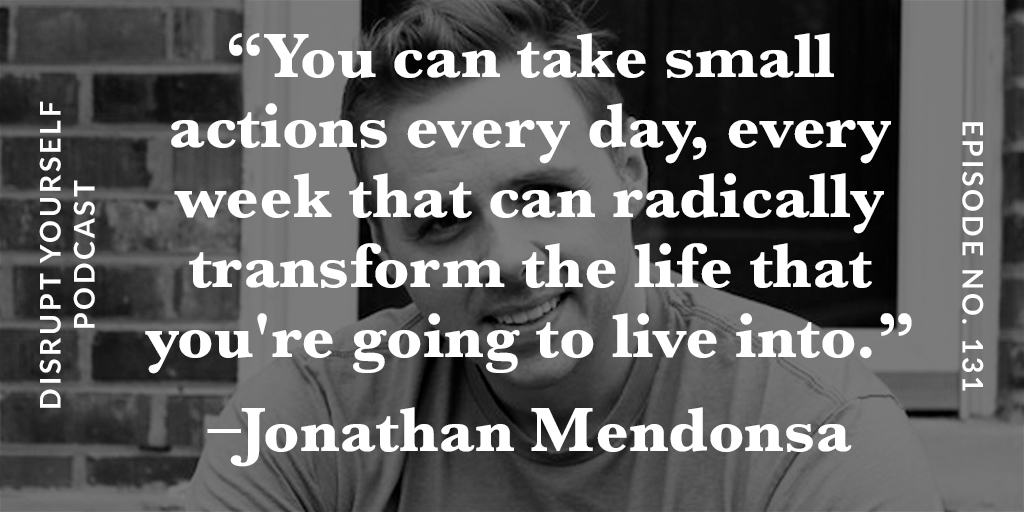In anticipation of the rerelease of Disrupt Yourself on Nov 12th, 2019, we are continuing our look at the 7-point framework of personal disruption. Today we are examining Accelerant #3, Embracing Constraints.
Jonathan Mendonsa graduated from Pharmacy school $168,000 in debt.
(Let that sink in for a moment.)
He knew it was not an ideal situation. He’d done what the world asked him to do—he’d picked a “safe and stable” job, completed high school, undergrad, and graduate school, and was now a functioning adult. It was time to put his nose to the grindstone and get to work.
He describes this period as being a time when he worked “like a madman,” and yet the payoff was not as satisfying as he originally hoped. With paying off his loans as his primary focus, Jonathan was able to pay everything off by his early thirties. The debt was gone…but what now? He was debt free, but he wasn’t who he wanted to be, and he was in a job he didn’t even like, let alone love.
Debt ties us to decisions. Jonathan continued to work long after he realized Pharmacy wasn’t for him, but now that he was no longer tied to that decision, what should he do next?
“[G]etting back to broke…it’s really just the beginning. Getting back to broke has you at steady state. You have a lot more options, but it doesn’t have you at a place where you never have to work for money again. You still have to go in and check in and make sure that you’re doing the right things. You still have to show up. And so, I was looking for…what’s next? What comes after being debt free? And I think that’s a natural question for someone.”
It was at this point in his journey that Jonathan stumbled into the Financial Independence community (commonly called “FI”). Getting to the point where work was optional and he could pursue his passions was unbelievably appealing. Jonathan found that by doing simple math he could determine his target numbers for saving and investing, and within ten years achieve the financial independence he craved.
It was at this point that Jonathan met Brad Barrett, a financially independent blogger known for using travel rewards points to see the world.
“So I found out [Brad] had actually reached financial independence as an accountant in his early to mid 30s and myself, I felt like I was someone that was on this path and was very energetic and enthused about it. I pitched him on the idea of doing a podcast where he would be in the role of someone who has made it, who’s followed these tactics and I would be someone that’s saying, “Does it still work? You know, does it work now? It’s great that it worked over the last 10 years. Does it work over the current 10 years?” So we, kind of, have this mentor/mentee type thing, and he said, “Yes.””
The Choose FI podcast now has over 145 episodes and engages a large and passionate audience. Jonathan and Brad also recently released a book, Choose FI: Your Blueprint to Financial Independence, outlining the key factors in financial independence that they have learned on their respective journeys.

I’m excited for you to hear more about Jonathan’s story, and see how by embracing his constraint (a tight budget) he was able to create a life he loves living and help others along the way.
Listen to the episode in the player above, or download and enjoy it on Apple Podcasts. If you’re so inclined, please leave us a review!
Takeaways from this episode:
- Small choices can radically transform your life. By imposing constraints on his spending, Jonathan was able to “get back to broke” quickly and is now free to work when he wants and with who he wants. True freedom comes from embracing constraints.
- When starting the podcast, Jonathan and Brad had little technical knowledge in how to get it done. Jonathan looked to Google and other free resources to fill in the gaps. Don’t let a lack of information stop you from moving forward. Where can you learn new skills and fill in gaps in your experience?
- At launch, the Choose FI podcast community was very small. Jonathan and Brad enthusiastically engaged their band of listeners and worked to produce a product that was helpful and of interest to their existing audience. The community grew primarily from word of mouth, which can only occur when you are meeting the needs of those who are showing up.
- If you’re feeling you have a lack of resources, take a step back and ask yourself “how can this constraint be a good thing?”
- This accelerant can be tricky. We think we need limitless resources to be successful, but this is often not true. Jonathan had very few resources, aside from a job, his determination, and self-discipline. But in the end, that was all he really needed.
Links Mentioned in this Episode:
- Jonathan Mendonsa – Website | Twitter | LinkedIn
- Choose FI podcast
- LifeLock
- Choose FI: Your Blueprint to Financial Independence by Chris Mamula, Brad Barrett and Jonathan Mendonsa
- Playing with FIRE documentary
- Disrupt Yourself, With a New Introduction: Master Relentless Change and Speed Up Your Learning Curve by Whitney Johnson

